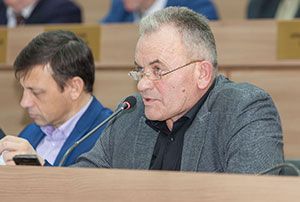 Русский
Русский English
English-







Igor Buga, "We give a clear signal for interaction to the public"

Chairman of the Committee of the Supreme Council for Public Associations, Sport, Information and Youth Policy, Igor Buga, commented on the main aspects of the package of legislations regulating the activities of the non-profit sector in an interview with parliamentary journalists.
"Four years ago, the Supreme Council adopted in the first reading a package of legislations relating to the work of non-profit organizations. It was drafted by deputies of the previous convocation headed by Vyacheslav Tobukh. Unequivocally, in the form in which the profile law was adopted, he had no right to exist, as he could actually blow up the public component of statehood. It was a "club" for any non-profit organization.
In Russia, it was also difficult to work on the same draft laws, which were finally adopted. At the same time, they were ambiguously perceived, both inside Russia and outside it. Discussions mainly focused on such concepts as "political activity", "foreign agent". Some considered the last term humiliating, offensive. But if you recall the history, then it must be said that in the US the law on this was adopted as far as 1939, in Russia - just a few years ago. However, over the years, the US State Department has already appealed to the State Duma three times to propose repealing this law. And the recent scandalous events around the television company Russia Today confirm that a similar law should be in our legal framework.
During the last four years, four public hearings on this topic have been organized under the auspices of our Committee, working meetings with various public organizations, including those financed from abroad, have been held. After that the deputies of the Committee came to the conclusion: it is necessary to change the concept of legislations. The final decision on them to the deputies of the Supreme Council is to be taken at the plenary session February 14.
The main thing is that these laws will determine the rules of the game in the relationship between the state and non-profit organizations. In addition, they will clearly identify the areas of activity that will be classified as political. In addition, we abandoned the very notion of "foreign agent" - these words are not in the law-in-draft. No one will need to register in this status. The main thing, and this has already found understanding of socially oriented NGOs, is the presence in the law of a whole chapter, where the concept of "socially-oriented non-profit organization" was first formulated. In the future this will allow receiving certain preferences from the state, support, including financial ones. The main criterion for classifying the organization as socially oriented is activity in areas and spheres that are not connected with politics. Everything that does not apply to politics will be considered a socially oriented activity. These are charity, ecology, sport, art, culture, health care, rendering social assistance to those in need, creating jobs and attracting investments, volunteering and much more. In this regard, we call on all NGOs: attract foreign financial resources, work in these areas, because today the state is not working on them because of the acute budget deficit.
Of course, NGOs are engaged in socially oriented activities even now, without the existence of a law, but they do so with an eye. That this was not, and this law is needed. At the same time, it is forbidden to engage in political activities for foreign money in the republic. Those who do not understand this will be warned first, then they will be deprived of registration.
Unfortunately, there is still a lot of misunderstanding in the public environment regarding this law, conjectures, insinuations. Those non-profit organizations that do not receive financial assistance from abroad, they can engage in all types of activities, including political, in accordance with applicable law.
With the adoption of these laws, the relations between the state and non-profit organizations will be streamlined. They already have a positive response from NGOs involved in charitable and other socially oriented activities. With the adoption of laws, everything will become much clearer and easier for them.
Subsequently, we intend to modernize the legal and regulatory framework in the sphere of registration and recognition of organizations as socially oriented, subsidizing their useful activities for society from the state".

